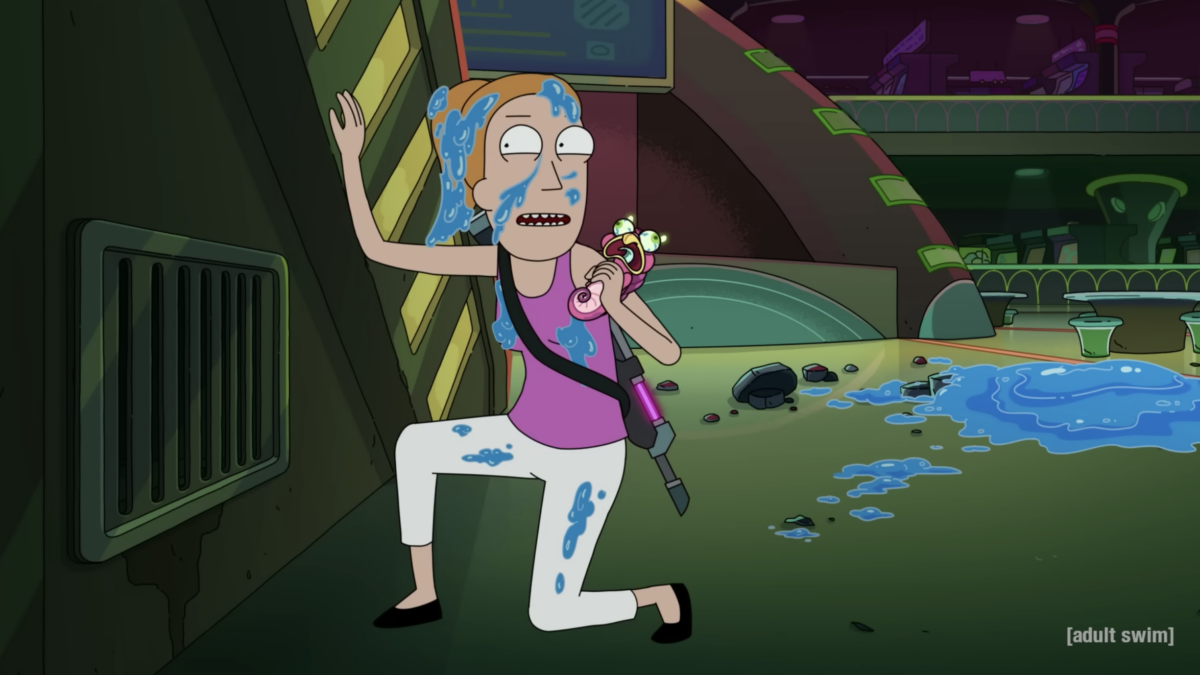“Die Hard” and its progeny were popular movies that have become, for some, a kind of cultural obsession. In the world of “Rick and Morty,” some alien species take that more seriously than others, as we see in this season’s second episode, “Rick: A Mort Well Lived.”
The episode begins with the two main characters and Summer in the “Blips and Chitz arcade,” a location Rick and Morty have visited before. The arcade contains a game called “Roy: A Life Well Lived,” in which the player becomes mentally connected to a video game world so lifelike that he really believes he is living out a man’s entire (fairly ordinary) life, only to emerge at the end to learn that just a few hours have passed.
Morty happened on this game kind of accidentally back in season two and seemed confused and disoriented by the experience, but must have changed his mind about it, because here in season six he is in the game, playing out Roy’s life once again. The complication this time comes from the real world, where a group of alien terrorists take over the arcade and hold everyone hostage.
Power is interrupted and the game reboots with Morty in it, scattering his consciousness among the game’s five billion non-player characters (NPCs). Pulling Morty from the game would kill him so rather than flee the terrorists, Rick inserts himself into the game as Roy and tries to convince the five billion NPC Mortys that they need to get on spaceships and leave, which resets the game and lets Morty safely exit.
Meanwhile, terrorists are roaming the arcade, so Rick tells Summer to “do a Die Hard” and defeat them while he saves Morty’s mind. Summer, like many 17-year-olds, has never seen the 1988 film, so she just wings it.
Meanwhile in the game, Roy/Rick explains that the five billion people of that virtual planet are all, in fact, one consciousness. This sounds an awful lot like a new religion, and many of those NPCs take it as such, holding revivals and singing hymns on the subject. Rick emphatically insists that it is not a religion — and in fact that even in the real world, religion isn’t real — but the people don’t get it. Misunderstanding aside, they believe that they are all one begins to spread through the game world.
The alien terrorists back in the real world are also “doing a Die Hard,” but consciously. Their leader (voiced by Peter Dinklage in an homage to Alan Rickman’s character in the real “Die Hard”) says that every civilization has a “Die Hard” myth. In his, it is something like a religion, complete with a holy book. Again, we have something that is not meant as a religion being taken as one by the masses.
Rick’s relationship with religion is complicated. He says often that it is all fake and seems for all the world like an outspoken atheist. But there are also instances when he references God as though he were real and known to him (episode 2 of last season begins with Rick announcing that they are “going to kill God”). So, maybe God is real, but Rick just doesn’t like him?
But for someone who hates religion, he does a great job of creating a system of belief that explains things about higher consciousness and what happens after we die — in the game, at least. As the game progresses, a now extremely elderly Roy/Rick has convinced 92 percent of the Mortys to join the cause, with the help of one charismatic early convert, a Morty NPC known as Marta. Some of the best jokes in the episode are about Morty not knowing things, which is why Marta’s family is Jewish but knows nothing of Judaism, because their only knowledge of humanity is what Morty knows. Likewise, the Pakistani Mortys all have Italian accents, because Morty doesn’t know what Pakistanis sound like.
This planetary unity, of course, all breaks down. The eight percent who are holdouts represent the most cynical parts of Morty — they know Rick is telling the truth about them all being one, but they prefer their in-game lives to dealing with real-life Rick. Lots of people in real life escape into video games, but here some of them plan to do it to an unimaginable degree, choosing to live a life they know is fake rather than help their overbearing grandpa bring them back to reality.
Outside, Summer defeats the dogmatic aliens by refusing to “do a Die Hard” the way they expect, and Rick is able to extract Morty — or most of him — from the game. All’s well that ends well?
But not so fast — the Morty that leaves the arcade is docile and trusting, seemingly stripped of the hard-earned doubts about Rick and his methods. Rick arranged to have the game kept running, so the pieces of Morty that doubt him are still alive, somewhere. Will that fraction ever be reunited with the rest? Will Morty trust Rick implicitly now? We’ll have to stay tuned to find out.









